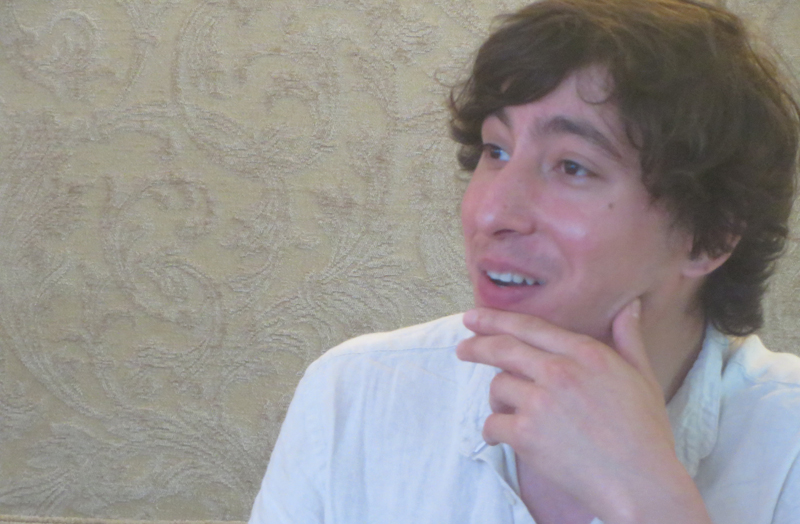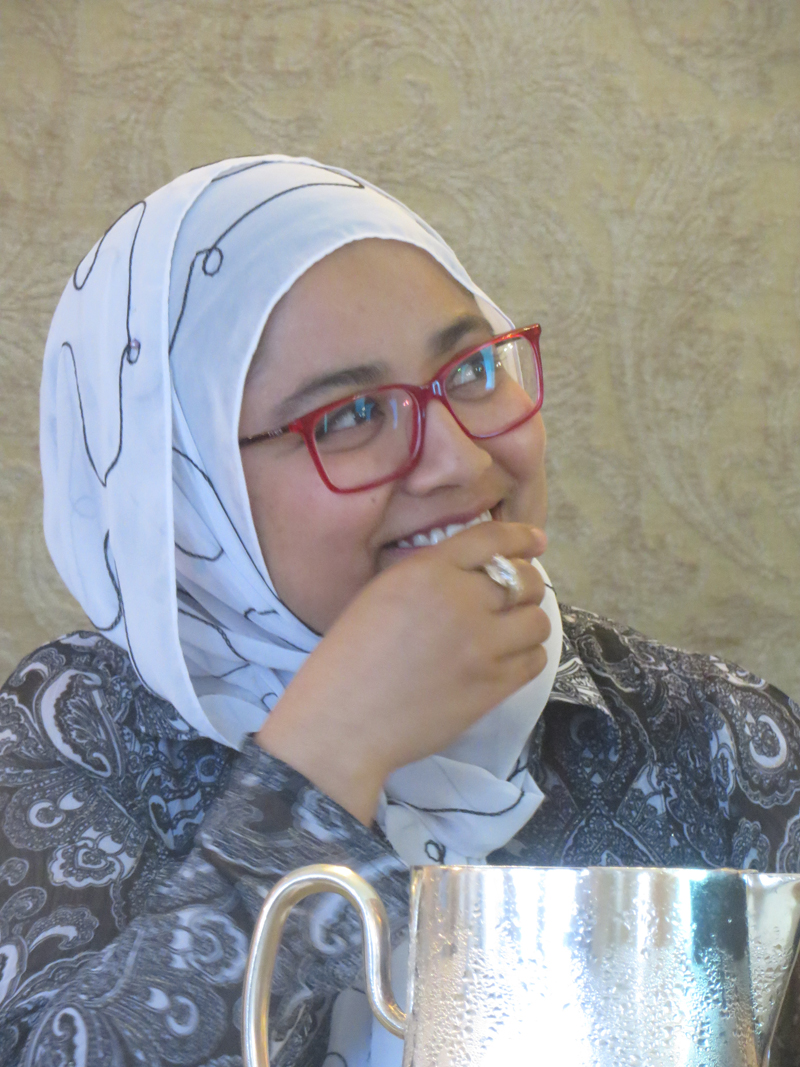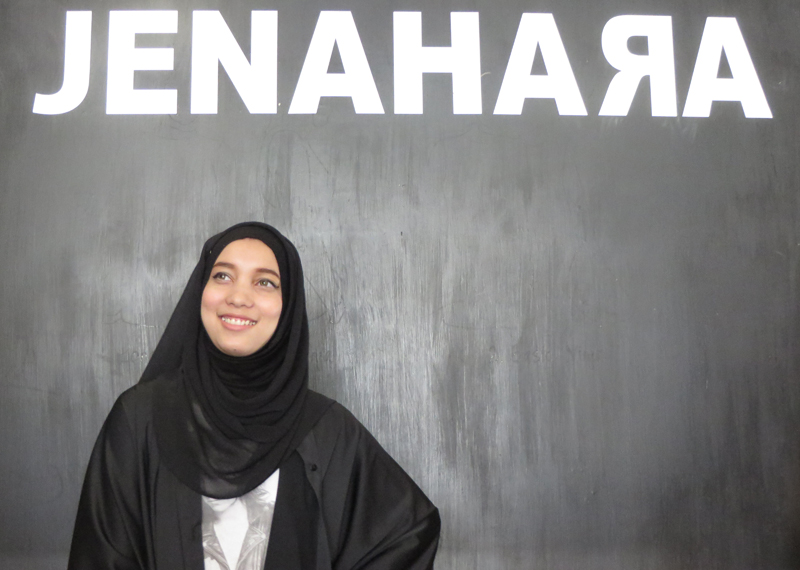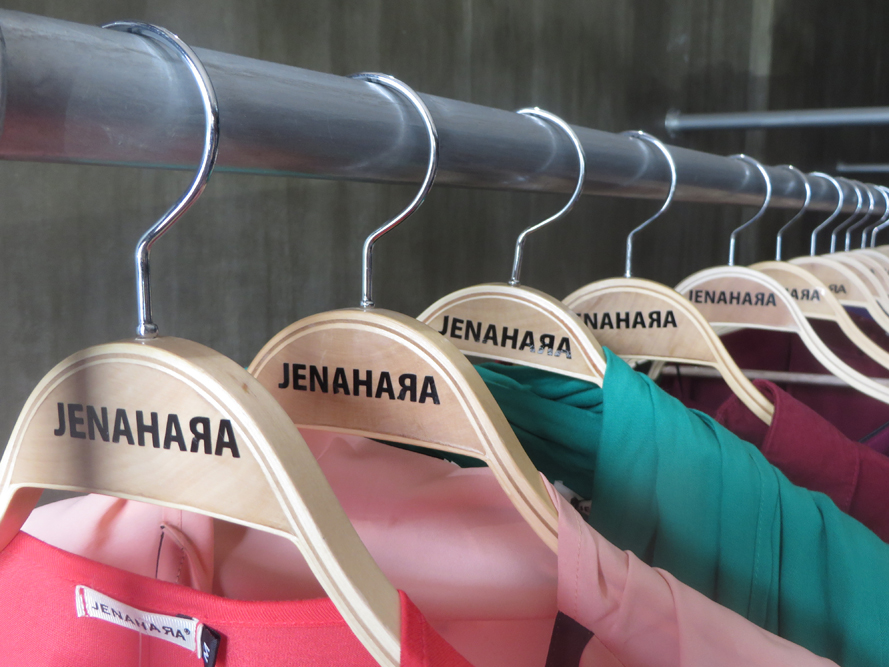(Travelblog is an occasional series of posts by RNS Editor-in-Chief Kevin Eckstrom, who’s on the road in Boston, Honolulu, Jakarta and Banda Aceh with the 2014 Senior Journalists Seminar, sponsored by the East-West Center in conjunction with the U.S. State Department)
JAKARTA, Indonesia (RNS) When is a hijab more than a hijab? When it’s used as a fashion statement.
When independent filmmaker Habib Yazdi released his “Somewhere in America” video last year, the two-minute piece featuring 26 young Muslim women in headscarves unleashed a flurry of online debate about what it means to be a Muslim in America.
There’s nothing racy about the video, unless you’re a tradition-minded Muslim who thinks women shouldn’t be seen outside in skinny jeans and cavorting around on skateboards. You can judge for yourself.

(RNS) Habib Yazdi co-founded Sheikh and Bake Productions to “create content that we didn’t have growing up” as Muslim youths. Photo by Kevin Eckstrom.
Yazdi, 28, said his Sheikh and Bake production company wanted to show contemporary women “trying to carve out their own space” in a culture that often makes knee-jerk assumptions about women who cover their heads. “We wanted to create content that we didn’t have growing up, the kind of content that could have shaped us as kids.”
The result, he said, was a “very American-oriented controversy about what it means to be here,” mostly hashed out on social media. When the controversy broke, some women in the video asked to be edited out. His Iranian-born parents, he said, struggled with it, but were ultimately supportive.

(RNS) Sahar Ullah founded the Hijabi Monologues as a forum for Muslim women to talk “about anything and everything, except the hijab.” Photo by Kevin Eckstrom.
Sahar Ullah, the New York-based creator of the Hijabi Monologues stage show, said the headscarf (like skin color) is an immediate visible identifier of religious identity. And like race, it often provokes an immediate reaction.
Which is exactly what 29-year-old fashion designer Jenahara has in mind with her eponymous line stylish clothes for Muslim women. Her small studio here features custom-designed clothing that is both modest and trendy. Much of it can be worn with or without a hijab. She said she wants to show the world that the hijab doesn’t have to be “conservative, old-fashioned, stiff or boring.”
What’s interesting is that many of her dresses are just that — off-the-shoulder numbers where the hijab is more of an accessory, not a central part of the design.

(RNS) Indonesian fashion designer Jenahara aims to give Muslim women clothing options that are both modest and stylish. Photo by Kevin Eckstrom.
“The Prophet Muhammad never actually said that women should only wear black,” she said, sporting a hijab, a graceful flowing “box shirt”, blue jeans and leopard print sneakers.
(The one thing she won’t design, she said, would be a face-covering niqab. Or a burqa.)
Jenahara saw Yazdi’s hijab video and wasn’t bothered by the women’s activities, although some of their tight clothes didn’t sit well. “It’s actually quite inspiring because it shows people that women wearing the hijab are just other human beings, doing things that they love.”

(RNS) The Jenahara fashion line in Indonesia aims to give Muslim women fashion that is both modest and stylish. Photo by Kevin Eckstrom.
In America, for most people, encountering the hijab is still pretty rare, but here on the teeming streets of this dynamic city, the hijab is everywhere. Women on scooters, young girls at the bus stop, university students and store clerks all don the hijab. Then again, a significant part of the population — I’d guess close to half — is uncovered.
For many people, the hijab is a kind of Rorschach test — we use it, unconsciously or not, as a barometer about our feelings on Muslims or Islam. But it’s important to remember that the hijab is a kind of two-way street. Just as we may project our feelings onto the hijab, many Muslim women use it to project their feelings outward, a sign of pride, not repression.
My colleague Emillia Amin is the only member of our delegation who wears the hijab. When she saw the hipster hijab video, she smiled broadly. In her native Singapore, hijabs aren’t allowed in public schools. Seeing the video, she saw a sense of liberation, personal identity and freedom.
“Women who can wear the hijab of their own free will,” she said, “are blessed.”
PREVIOUS TRAVELBLOG POSTS:
- 3 things Indonesia can teach the Muslim world: The Islam we see out of the Middle East may be skewed
- Are you a Christian? What do we mean when we ask questions like that?
- Hate speech, the First Amendment and religious sensitivity. Hate speech is an amorphous beast. Who defines it?




